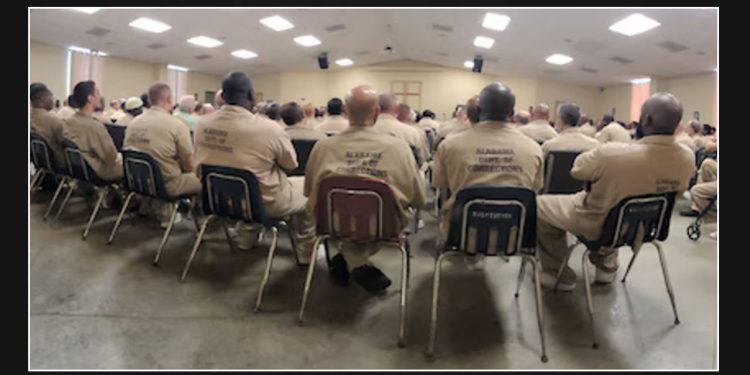During a hearing on Monday, attorneys representing six inmates in Alabama argued that the prison system’s discipline of inmates who refuse to work is a violation of the recently revised state Constitution.
In May, the prisoners brought forth a lawsuit claiming that they desire to work for an employer that is not within the prison system. They explained that they should not be penalized by the prison system for refusing to work if they are unable to or if they choose not to work due to reasons such as health issues or hazardous working conditions.
According to the lawyers representing inmates, the Alabama Department of Corrections has the authority to impose penalties on prisoners who miss or refuse work. These penalties include revoking phone privileges and commissary access, as well as taking away good time and placing someone in solitary confinement. Moreover, the department can assign more work to prisoners without any compensation.
Prison punishments can result in a record of disciplinary infractions, which can have a negative impact on an individual’s chances of being granted parole or deemed safe enough for work release.
Lawyers from the Center for Constitutional Rights are representing the six inmates, who are all Black and include five males and one female. However, the inmates were not present during Monday’s hearing.
Jessica Vosburgh, senior staff attorney, emphasized that the workers have a desire to work. However, they are not willing to face consequences in case they are unable to work.
In Montgomery County Circuit Court, a lawsuit has been filed based on the recent change in the state Constitution. This change was made after voters in 2022 voted to update the document and remove racist language. The lawyers involved in the case pointed out that the new state Constitution’s Article 1, Section 32 states that “no form of slavery shall exist in this state,” and “there shall not be any involuntary servitude.”
In 2022, the people of the state voted to ratify a new state constitution that prohibits slavery and involuntary servitude in all its forms, without exceptions. However, the state has failed to comply with this mandate, which is why the lawsuit has been filed. The lawsuit contends that the state’s refusal to follow the will of its citizens is a blatant disregard for their rights.
On Monday, the hearing was scheduled to address the state’s request to dismiss the case. Although the federal case and the state case both involve allegations regarding the state’s work release program, they are slightly different. The state case, which is being handled by Circuit Judge James Anderson in Montgomery County, focuses on similar allegations. In December, the federal case was filed, and the prisoners claimed that they were denied parole and forced to work in fast food restaurants as part of a “labor-trafficking scheme,” which generates $450 million annually for the state.
In the lawsuit filed on Monday, attorneys listed several reasons why inmates may refuse to work, including concerns about health hazards, insufficient pay, and workplace harassment or abuse.
According to Vosburgh, compared to other problems faced by the Alabama Department of Corrections, the case is “relatively simple.” The inmates are not looking for any compensation, but simply for an order that would prevent the department from punishing them for their refusal to work.
According to Vosburgh, if an employee fails to show up, being fired is a reasonable consequence. The case, however, concerns the Department of Corrections’ imposition of additional penalties.
During the hearing, the attorney representing the state argued that the matter revolves around good time, which is not available to the majority of the six plaintiffs. He further explained that the sanctions imposed on the inmates are a result of their participation in work release, a privilege that is not mandatory. As per his argument, inmates voluntarily sign up for work release.
Assistant Solicitor General Soren Geiger expressed disbelief that the citizens of Alabama had intentions of completely transforming the Alabama Department of Corrections, in reference to the constitutional amendment vote of 2022.
According to him, the focus of the case lies in obtaining the advantages of work release or community-based programs without adhering to the regulations.
According to the state’s motion to dismiss the case, the six inmates are attempting to leverage the linguistic updates in the 2022 Constitution to contest the incentive system of Alabama’s prison system.
To put it simply, the prisoners are requesting a court order that would allow them to leave their assigned duties on a daily or even hourly basis, regardless of the legitimacy of the cause.
After hearing approximately 20 minutes of arguments on the case, the judge refrained from issuing a verdict right away.
Anderson declared from the bench, “I will examine everything with a fresh perspective now.”
After the hearing, Vosburgh expressed her optimism regarding the judge’s upcoming decision.
“I believe that he will rule in our favor,” said the speaker confidently.

